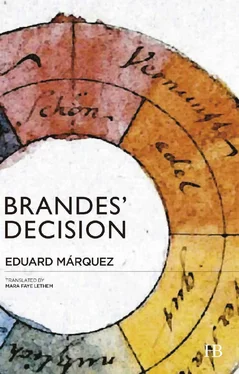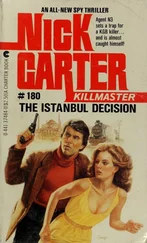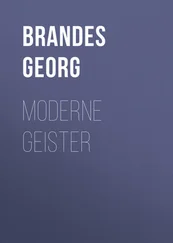I’ve always been pretty obsessive. Having to confirm a bunch of times that I’ve closed a door properly or that I haven’t left any light on in the house is a drag, but there’s nothing I can do about it. During the first months of my illness, I went through the same thing with my medication times. Now I don’t even worry about it. I couldn’t care less. Since I don’t have any hope that it’ll do anything, I don’t worry if I’ve forgotten my dose. The doctor doesn’t understand it, but I think he’s given up. At least he no longer insists. He must think I’m a lost cause. But nothing happens, and that’s what I’ve tried to make him see, because I have the impression that he feels a little guilty for his inability to spur me on to continue to play the game out to its end.
As a little kid, I was as terrified — or more — of getting sick as I was of running into the basilisk. That’s why I did everything I could to keep from complaining when I was feeling poorly. Until I couldn’t stand it anymore or until the symptoms were so obvious that my father noticed. Then, as always, he called for Doctor Zomer. They were friends, and he trusted him so deeply that he didn’t care that I panicked over his resemblance to Doctor Moreau from the Wells’s novel that Marcellus Goldschmidt had loaned me and I’d read, stiff with fear. With his white hair, his narrow forehead, his thick lips with drooping corners, those small black eyes topped by thick brows. . Or that was what I thought when I saw him come into my room with his kit under his arm. I was convinced that Doctor Zomer had read Wells’s book and was secretly continuing Doctor Moreau’s experiments, except instead of turning animals into men, he was doing it the other way around. That was why he looked at my throat, eyes, and ears with such avid interest. And squeezed my belly and made me cough. To find out which beast would be best suited for my body. And I feared that, when my father was distracted, he would try to turn me into a dog. Or a hyena. Or a monkey. I’m not surprised that, sometimes, between one thing and another, it was so hard to get my fevers down. Like now. But the doctor says it’s normal. Because of the tumor and I don’t remember what else. Maybe, if I tell him a little bit about Doctor Zomer’s visits, he’d understand it might also be because of my apprehension.
When I would explain all that to Alma, she couldn’t believe I was so impressionable. “You’re almost as lily-livered as me,” she would say when I listed my childhood fears.“But with a lot more imagination. Just my father was enough to make me shit my pants.”
I could talk to Alma so easily. Much easier than anyone else. And even though sometimes it was hard for her to get started, she was no slouch either. But you had to know when it wasn’t the right moment. Either because she wasn’t in the mood or because she was studying for a role. Then it was best not to bother her. Occasionally though, she would let me help her. When she died, she was on her way to the first rehearsal of The Stronger , by Strindberg, in a production by the Théâtre de l’Atelier. For two or three weeks she prepared for it in Hauterive and asked me to play the part of Miss Y. Since the role of Miss Y is always silent, all I could do was nod my head, make a disdainful expression, laugh loudly, or observe Mrs. X curiously. Even though it was completely different from The Human Voice , Alma’s monologue was equally affecting. When she compared Miss Y with an empty vessel or when she rebuked her for her inability to love, her voice really stung. Sometimes, when we were rehearsing, I thought how I was lucky she hadn’t ever had to use it against me. I don’t even know if I could have endured one of those harsh, arrogant stares. Even though I suppose I shouldn’t have been surprised — after all, it was her job to play roles — it upset me to see that Alma could bring up such rage from inside her. One day, after rehearsing, I got up the courage to tell her that. Alma didn’t answer for a long time. And, when she did, I regretted having opened my mouth because every one of her words sounded like a reprimand to herself. “It’s just that, sometimes, I don’t know what to do with all the hatred I feel,” she finally said.
Alma could be very hard on herself. Not only when things didn’t come out the way she felt they should — she was demanding — but also when she was in one of her “black moods,” as she called them. Then, overwhelmed by the despair she felt over not having found a way to forgive or a way to digest her guilt, she would disappear for hours. “I have no right to complain,” she told me more than once,“but being a survivor, without even knowing how or why, isn’t as easy as it seems.” Having randomly been one of those who made it out of Ravensbrück and having abandoned her mother to get away from her father and devote her life to the theater were burdens that weighed too heavily on her. Telling her that I understood, that her Ravensbrück was my trench and that her mother was my Konrad, wouldn’t have been of any use. I never knew how to help her. Over time, I’ve come to the conclusion that, when you understand someone else’s suffering too well, you aren’t the right person to console them.
Forgiving is toughest of all, because it’s hard to find the midpoint between clemency and resentment. Alma was convinced that, depending on who you were trying to forgive, it wasn’t worth the effort. In fact, she never forgave The Binz. And she didn’t feel bad about it at all. I’m not surprised. When I think of the fear that Sergeant Forkel put me through and everything I haven’t been able to share with Alma because of the drunk switchman, I tend to agree with her. I haven’t forgiven Hofer either. Even though I hesitate there, since without Hofer I never would’ve been able to put my foot down. But I often wonder if that’s enough to overlook the bitterness I feel towards him.
It wouldn’t be bad if, at this point, when what I should be doing is not worrying about things, the water streaming down the panes would wash away all the uncertainties. Maybe then I could sit beneath the ginkgo by the lake and listen to the murmur of its leaves. Or even better: clearly remember my father’s voice, standing beneath the ginkgo in the Luxembourg Gardens as shelter from the rain, talking to me about a family dispute that I didn’t really understand, over a silver candelabra with arms in the shape of ginkgo leaves that led Grandma Johanna and one of her sisters — the famous “rich aunt, but you know where it came from” as everyone called her — to not speak for years; or Alma’s misty eyes as she looked up at the façade, decorated with ginkgo branches and leaves, of Prague’s Hotel Central, where she had seen her mother for the last time and where we stayed during our trip to recapture the landscapes of her childhood; or my mother’s dreamy pose in one of the studio photographs in her album, with a fabric backdrop embroidered with ginkgo leaves. A bunch of coincidences like any other yet, even though I know it has no special significance, I like to think it helps keep my memories from completely slipping away.
It seems my mother assembled her photo album for the same reason. According to my father, she spent many hours during her last months working on it for me. I’ve never seen anything like it: one photograph per page, glossed in her spiky handwriting. There was a bit of everything. Portraits of her parents and siblings; wedding pictures; postcards from their Paris honeymoon and some other trips. .“Here’s the little Buddha with a cranky face,” it says beneath one of my portraits. Bald, chubby-cheeked, serious. Father told me more than once that he’d have given anything to make me understand that I wouldn’t have a mother for very long, since, maybe that way, I would be less peevish. The conclusion one can draw from looking at the album is that, for Mother, everything happened very fast. Childhood, youth, love, marriage, birth, and death. But was she happy? I believe so. As you turn the pages, it’s inevitable that you wonder what’s better: a short but intense life or a long, tedious one.
Читать дальше












